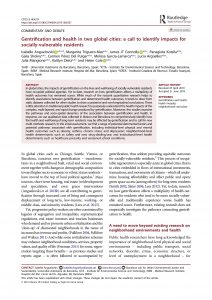Cities & Health
By Isabelle Anguelovski, Margarita Triguero-Mas, James JT Connolly, Panagiota Kotsila, Galia Shokry, Carmen Pérez Del Pulgar, #UnequalCities Network member Melissa García-Lamarca, Lucía Argüelles, Julia Mangione, Kaitlyn Dietz, and Helen Cole
Abstract: In global cities, the impacts of gentrification on the lives and well-being of socially vulnerable residents have occupied political agendas. Yet to date, research on how gentrification affects a multiplicity of health outcomes has remained scarce. While much of the nascent quantitative research helps to identify associations between gentrification and determined health outcomes, it tends to draw from static datasets collected for other studies to draw a posteriori and non-longitudinal conclusions. There is little attention in traditional public health research to purposely understand the health impacts of the complex, multi-layered, and rapid change produced by gentrification. Moreover, few studies examine the pathways and socio-spatial dynamics of the association between gentrification and health. In response, we use qualitative data collected in Boston and Barcelona to comprehensively identify how the health and well-being of long-term residents may be affected by gentrification and to call for new multi-methods research. In this initial assessment, we find a range of potential detrimental factors and potential pathways associated with gentrification, including individual-level physical and mental health outcomes such as obesity, asthma, chronic stress, and depression; neighborhood-level health determinants such as safety and new drug-dealing/use; and institutional-level health determinants such as healthcare precarity and worsened school conditions.
Download >> Gentrification and Health in Two Global Cities: A Call to Identify Impacts for Socially-Vulnerable Residents


